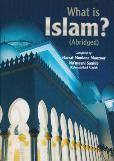What is Islam - eBook
Displaying items by tag: hazrat abu zar
Hazrat Abu Zar Ghifaari (radhiyallahu 'anhu) - Part Four
The Second Narration (continued):
Hazrat Abu Zar (radhiyallahu ‘anhu) said (continuing the incident of his embracing Islam):
One bright, moonlit night, I was by the Ka‘bah when the people of Makkah Mukarramah were sound asleep. Myself aside, there were only two women present and they were making tawaaf. Whenever these women would pass by the two idols, Isaaf and Naa’ilah, they would call out to them in supplication. As they drew close to me, I called out to them in mockery of their idols, “Marry one to the other!” My statement drew no response, however, as they continued calling out to their idols in supplication. The next time they came close to me, I called out, “Your idol has a private part of wood!” except that I did not use an ambiguous word indicating towards it but rather used an explicit word to refer to the private part. This statement finally excited a response as the two women now began to go about calling out in supplication to their idols for me to be destroyed and were proclaiming, “If only some of our people were here to punish you!”
Hazrat Abu Zar Ghifaari (radhiyallahu 'anhu) - Part Two
Accepting Islam: There are different narrations recorded regarding Hazrat Abu Zar (radhiyallahu ‘anhu) accepting Islam.
The First Narration: The first narration is reported by Hazrat ibn ‘Abbaas (radhiyallahu ‘anhuma). He says:
When the news reached Hazrat Abu Zar (radhiyallahu ‘anhu) that Nabi (sallallahu ‘alaihi wasallam) had claimed Nubuwwah, he said to his brother, “Travel to the valley of Makkah Mukarramah and enquire regarding the person who claims that he is a Nabi who receives revelation from the sky. Listen to his message and thereafter return to me.”
Hazrat Abu Zar Ghifaari (radhiyallahu 'anhu) - Part One
Name: Jundub bin Junaadah (Isaabah 7/105, Usdul Ghaabah 1/343)
Appellation: Abu Zar
Mother’s Name: Ramlah bint Al-Waqee‘ah (Usdul Ghaabah 4/436, Istee‘aab 1/321)
Physical Description: He was a tall, thin Sahaabi who was wheat colored in complexion and had a thick beard. (Isaabah 7/107, Siyar A‘laam min Nubalaa 3/379)







